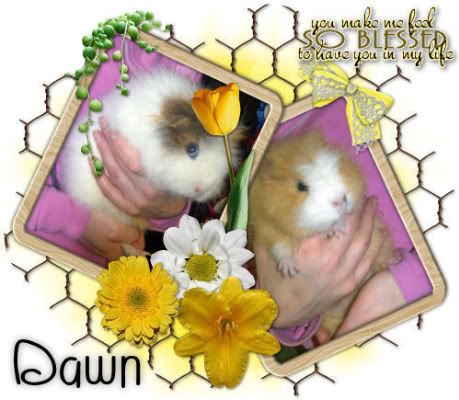Post by Dawn - Admin on Sept 15, 2005 15:10:04 GMT
It is extremely important to know basic cavy healthcare. For example, do you know the signs of a healthy cavy? And an unhealthy one? The better your knowledge of basic healthcare, the quicker your pig will recover if he should fall ill.
Finding a vet
Most new cavy carers will register their pigs at any old vet, but it will definitely pay off in the long run to ring around and find an experienced cavy vet. This type of vet is usually either a qualified rodentologist or an exotics vet.
Rodentologists are specifically trained in the care of small animals, particularly guinea pigs.
Exotics vets receive more training in the care of exotic animals (cavies included) than normal vets.
Before you register with a vet, it is advisable that you ask the vet a number of questions:
How much experience have you had with treating guineas?
How would you perform a general health check on a piggy?
How many times have you operated on a cavy?
How big would you say the risk is of anaesthatising a cavy?
What treatment do you recommend for mites?
What treatment do you recommend for a URI?
What medicines are very poisonous to pigs?
All the answers you should receive can be found at Guinea Lynx.
The signs of a healthy cavy
The first thing you should look at is the physical side of things. A healthy pig has:
A dry, clear nose;
Clear, bright eyes;
Clean ears;
A shiny, full coat;
Skin free of redness/irritation;
Aligned incisors;
Short nails;
Formed poops;
Clean genitals.
In terms of the way a healthy cavy acts:
Alert;
Interested;
Inquisitive;
Silent breathing.
If yur pig shows any of the following symptoms continuously over a period of 24 - 48 hours, take your little companion to an experienced vet as soon as possible:
Refusal to eat;
Discharge from the eyes or nose;
sneezing;
Coughing (not while eating);
Noisy breathing;
Runny poops;
Exhaustion/lethargy;
Excessive scratching, grooming or biting.
It is especially important to get your pig checked out if he sneezes for than 4 or 5 times a day. The occasional sneeze does not necessarily indicate a problem, but violent sneezing or sneezing every hour could inidicate a respiratory problem (see below).
Copyright © 2005 Laura Humphreys. All Rights Reserved
caviesunited.bravehost.com
Finding a vet
Most new cavy carers will register their pigs at any old vet, but it will definitely pay off in the long run to ring around and find an experienced cavy vet. This type of vet is usually either a qualified rodentologist or an exotics vet.
Rodentologists are specifically trained in the care of small animals, particularly guinea pigs.
Exotics vets receive more training in the care of exotic animals (cavies included) than normal vets.
Before you register with a vet, it is advisable that you ask the vet a number of questions:
How much experience have you had with treating guineas?
How would you perform a general health check on a piggy?
How many times have you operated on a cavy?
How big would you say the risk is of anaesthatising a cavy?
What treatment do you recommend for mites?
What treatment do you recommend for a URI?
What medicines are very poisonous to pigs?
All the answers you should receive can be found at Guinea Lynx.
The signs of a healthy cavy
The first thing you should look at is the physical side of things. A healthy pig has:
A dry, clear nose;
Clear, bright eyes;
Clean ears;
A shiny, full coat;
Skin free of redness/irritation;
Aligned incisors;
Short nails;
Formed poops;
Clean genitals.
In terms of the way a healthy cavy acts:
Alert;
Interested;
Inquisitive;
Silent breathing.
If yur pig shows any of the following symptoms continuously over a period of 24 - 48 hours, take your little companion to an experienced vet as soon as possible:
Refusal to eat;
Discharge from the eyes or nose;
sneezing;
Coughing (not while eating);
Noisy breathing;
Runny poops;
Exhaustion/lethargy;
Excessive scratching, grooming or biting.
It is especially important to get your pig checked out if he sneezes for than 4 or 5 times a day. The occasional sneeze does not necessarily indicate a problem, but violent sneezing or sneezing every hour could inidicate a respiratory problem (see below).
Copyright © 2005 Laura Humphreys. All Rights Reserved
caviesunited.bravehost.com





